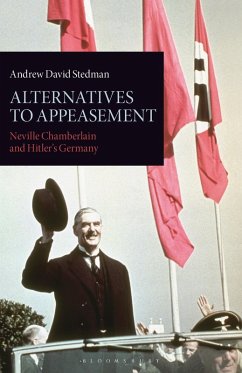Neville Chamberlain's policy of appeasing Hitler's Germany has been widely condemned. However, historians (and politicians) have been divided about the viability of alternative courses of action. Andrew David Stedman here charts the origins, development and viability of the various alternatives to Chamberlain's policy of appeasement. Using a wide range of sources, many previously unpublished, he provides a fascinating study of British foreign policy before World War II, surveying the main advocates of the other strategies available and outlining the complexities of each rival option. Providing a valuable new contribution to appeasement historiography, this is the first work to offer a comprehensive synthesis of all the alternatives available to Chamberlain, as well as to illuminate the policy debate within Government itself. Stedman provides a unique analysis of how realistic Chamberlain deemed each policy to be, as well as a bold assessment of strengths and weaknesses.
Stedman asserts that it was understandable that Chamberlain rejected the other policies he had available to him and that, contrary to popular belief, Chamberlain did in fact consider and explore each alternative as part of his wider strategy and his foreign policy often contained elements of the rival options. Ultimately, this book shows that none of the alternatives would have maintained a lasting peace in the troubled conditions of the 1930s. Although some might have affected the favourability, timing and circumstances of conflict, war could not have been avoided given the rapid rise of Hitler and Nazi Germany. Also contributing to debates on the use of appeasement in the modern world, this book will be essential reading for historians of World War II and the twentieth century, as well as scholars of International Relations.
Stedman asserts that it was understandable that Chamberlain rejected the other policies he had available to him and that, contrary to popular belief, Chamberlain did in fact consider and explore each alternative as part of his wider strategy and his foreign policy often contained elements of the rival options. Ultimately, this book shows that none of the alternatives would have maintained a lasting peace in the troubled conditions of the 1930s. Although some might have affected the favourability, timing and circumstances of conflict, war could not have been avoided given the rapid rise of Hitler and Nazi Germany. Also contributing to debates on the use of appeasement in the modern world, this book will be essential reading for historians of World War II and the twentieth century, as well as scholars of International Relations.









